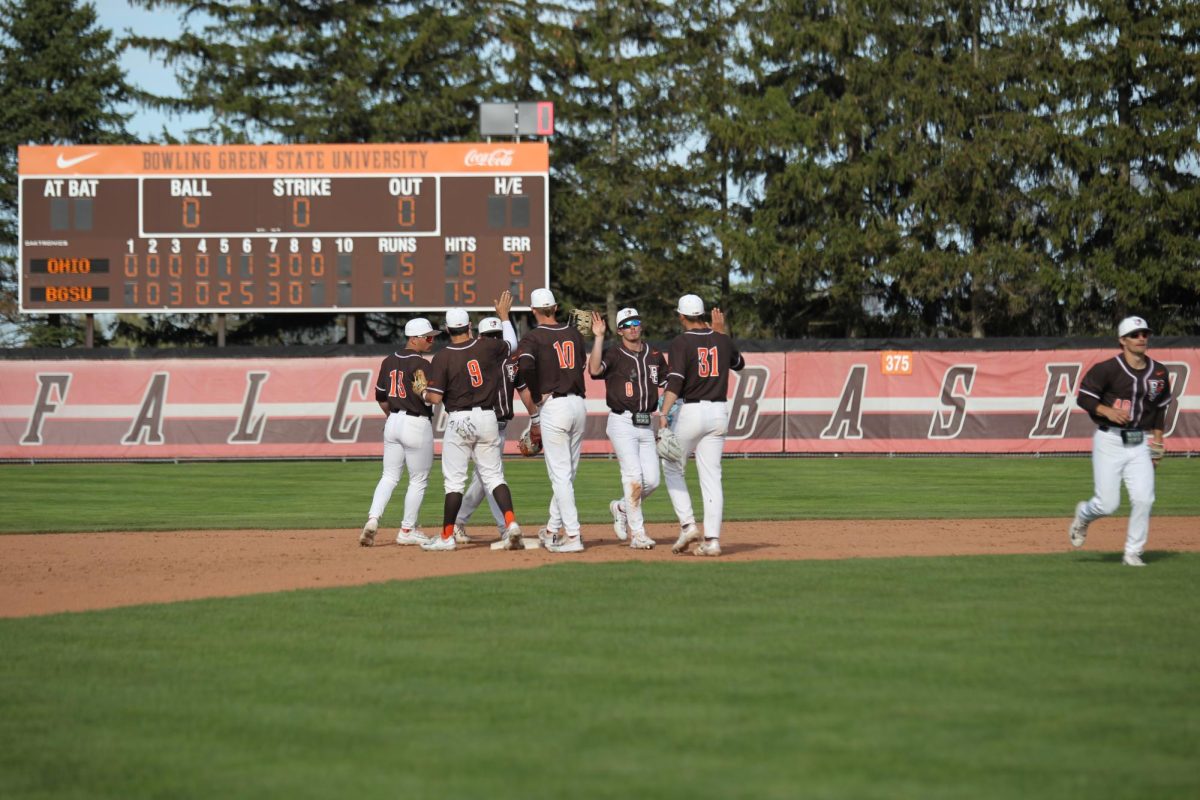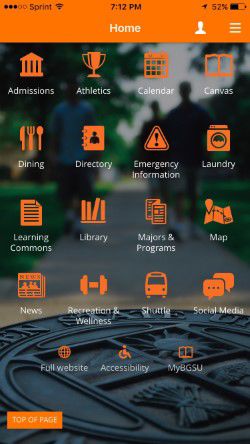The new BGSU App allows users to tap into online information efficiently from their phone, but it is far from being “App-solutely BGSU.”
The BGSU app should work well for most people, but will not always work for those with disabilities. The app worked correctly most of the time with Android’s accessibility features which help those with impairments use Android apps. However, the app occasionally struggled with certain accessibility functions of the Android Operating system. This could limit the ability of those with low vision to use the app.
One notable issue is the occasional loading of Chinese characters in place of an icon, or strange layout issues. Android testing was performed on an LG G5 running Android 6.0.1 and Android 7.0.
The BG News did not find these usability issues in the iOS, iPhone’s operating system, version of the app, which displayed icons and layouts correctly during all tests performed on an iPhone 5c running iOS 10.
An inspection of the app for Android reveals the use of the GNU Project’s libivconv library, which is licensed to the public under the GNU Lesser General Public License.
The LGPL requires that users “Give prominent notice with each copy of the Combined Work that the library is used in,”
The LGPL also requires that users of the software “[a]ccompany the Combined Work with a copy of the GNU GPL and this license document.” However, no such credit or license document currently exists within the app.
It’s currently unclear whether the University is in compliance with the open source libraries used in its app, as it’s possible the University has somehow satisfied the official license requirements.
Instead of being a product of a University office, the underlying software behind the BGSU App comes from Modo Labs in Cambridge, Massachusetts.
The app is based off of the Kurogo Mobile Platform, a decedent of the MIT Mobile Web Open Source Project. Andrew Yu, who is a founder and CTO of Modo Labs, described the motivation to create his frameworks as stemming from a frustration with the state of the mobile internet in 2010, describing the possible time to find some common pieces of information as being around eight minutes using a mobile phone.
“Eight minutes was a very long time, and we were at MIT, and this is supposed to be the most advanced institution. This is ridiculous,” Yu said.
Yu said his MIT Mobile Framework, and later his Kurogo mobile platform, lessens the time to find the same information down to seconds. The framework integrates information available on the World Wide Web as hypertext into a mobile phone application, eliminating the need to browse through a website to acquire information, thus making that information more convenient and useful to the user.
This also means that the application itself rarely needs to be updated for an “update” to occur, since all app content is scraped from the web. That is to say the app can be updated without it waiting for your consent in the Apple App Store or the Play Store. Thus like the web, the app is in a constant state of flux, subject to change, improve, or disappear at any moment.
Yu also said his framework allows non-technical users to get involved in the app creation process, allowing for App development to be delegated away from technical departments.
While Modo Labs creates a tool, it’s up to the University for it to be useful. The BGSU App offers integrations into many, but not all, University WebApps. Unfortunately, the app does not always utilize features of the Kurogo Mobile Platform.
One example is how the app loads information from the University’s website. Yu said a major feature of Kurogo platform is the ability for apps to integrate only specific elements of a webpage, instead of the entire webpage. Currently the app often simply loads the entire website and displays it in the app, creating styling and usability issues.
Not all webapps offered by the University are currently used by the app. Support for BuildingOS and other green features, security features and student involvement are notably missing from the app.
Other institutions using Kurogo include features the University does not. The University of Findlay offers College Radio streaming and computer lab information from their app. Texas A&M offers its student newspaper, The Battalion, in its app. Texas A&M also offered the ability to hail a security escort from their app.
The University of Notre Dame offers indoor maps of campus buildings, information on campus sustainability and live webcam feeds of campus in its app. All institutions mentioned use the Kurogo framework for their official app.
An interview was requested using the University’s official mobile application contact; however, there has been no response since this request was issued over two weeks ago.
Some members of the University community are concerned about the proprietary nature of the app. Kurogo used to be free software, but currently exists as proprietary software due to a license change in 2013.
“Ideally, if the school is producing/funding a software project, the software/program must be free (free as in freedom) software,” University Alumni Siddharth Ravikumar said in an email.
Siddharth noted that he considers free software to be the definition the Free Software Foundation uses for free software, which specifically refers to freedom as the ability for the user to use, study, modify, and redistribute the program as they see fit and not specifically free as in monetary cost.
“It is also important for schools to exclusively use free (free as in freedom) software in their programs/courses,” Siddharth said.


















